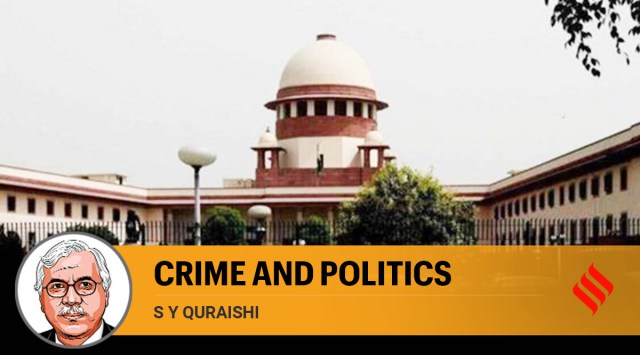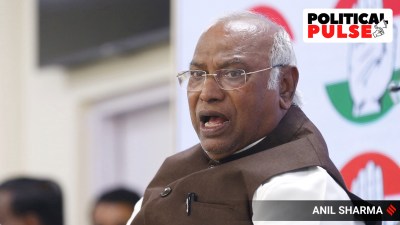- India
- International
Criminalisation of politics must be curbed
S Y Quraishi writes: While SC recently expressed anguish over the issue, legislature and political parties remain reluctant to act.
 The Supreme Court of India (Express Photo/File)
The Supreme Court of India (Express Photo/File)On August 10, the Supreme Court made a new move in its bid to call into question the rising tide of criminalisation in Indian politics. The judgment came in response to a plea of contempt filed by advocate Brajesh Singh against political parties flouting its orders regarding disclosing criminal antecedents of candidates in the 2020 Bihar Assembly elections. “The nation continues to wait and is losing patience,” the apex court has gone on record to say.
The court has imposed fines of Rs 1 lakh on the BJP, the Congress and the JD(U), among others, for failing to comply with its orders regarding complete disclosure of their candidates’ criminal history. The CPI(M) and the Nationalist Congress Party were fined Rs 5 lakh for complete failure to comply with any of its mandates.
Growing criminalisation has been a constant theme of Indian politics. According to the Association for Democratic Reforms (ADR), 233 MPs in the current Lok Sabha are facing criminal charges, up from 187 in 2014, 162 in 2009 and 128 in 2004.
The current orders of the SC have put a new onus on the Election Commission to do something concrete, for example, create a phone app to display the detailed criminal history of any contesting candidate. This should be accompanied with a separate cell in the ECI to monitor the compliance of all the political parties regarding this; any breach should be brought to the attention of the SC without delay.
While seeking to add strength to the Election Commission to combat criminalisation is a welcome step, the Supreme Court remains sceptical about the legislature taking concrete steps to solve the problem. This scepticism is not unwarranted. Political parties in India have always been notoriously reluctant to introduce changes to combat criminalisation, and the excuses they have given for doing so have remained nearly unchanged since Independence.

The Supreme Court has, however, stopped short of drastic steps to combat this problem. It has rejected the suggestion of senior advocate and amicus curiae KV Viswanathan to direct the Election Commission to bar political parties that fail to comply with criminalisation protocols by using its authority derived from Clause 16A of the Election Symbols Order. This step, the SC reasons, would be going too far and infiltrating the domain of the legislature.
The legislature has been very slow in addressing this issue, and political parties remain extremely reluctant to change their ways, citing two major excuses. “Winnability” of candidates is the first reason. The logic of a candidate with criminal charges doing good for the people of a constituency is dubious at best. The winnability clause is an attempt by the party to absolve itself of all blame and put the onus of sending a criminally charged candidate to Parliament solely on the voter. This is unacceptable.
The other reason offered by political parties is summarised by the maxim of Indian law, which is that any accused is innocent until proven guilty. Most criminally accused candidates, Indian political party spokespeople maintain, are the victims of “vendetta politics”. While there is some merit to this argument, I have pointed out the fallacy of its application in this matter multiple times. There were 4.78 lakh prisoners (as of December 2019) of whom 3.30 lakh were under trial, i.e. not yet proven guilty. Yet, their fundamental rights — their right to liberty, freedom of movement, freedom of occupation and right to dignity — are curbed completely.
I have posed this question on various fora, where honourable judges and eminent jurists were present. Nobody has ever explained this paradox to me. Besides, the SC had annulled the appointment of a Central Vigilance Commissioner on the ground that a criminal case was pending against him. These blatant double standards are a clear violation of Article 14, which guarantees to all citizens equality before the law. Even a peon cannot be appointed if even a minor criminal case is pending against him. But a person chargesheeted for murder or rape can become a legislator and even a minister.
 To add insult to injury, an “innocent” undertrial cannot vote, but a man chargesheeted for murder can even contest election from jail.
To add insult to injury, an “innocent” undertrial cannot vote, but a man chargesheeted for murder can even contest election from jail.
The ECI has suggested some safeguards against vendetta politics. First, only offences that carry an imprisonment of at least 5 years are to be considered. The case against the candidate should have been filed at least six months before the scheduled elections for it to be considered. And finally, a competent court must have framed the charges.
An alternative solution would be to try cases against political candidates in fast-track courts. The Supreme Court had sent a directive to this effect as far back as 2014, directing that cases against political candidates must be completed within a year, failing which the matter should be reported to the Chief Justices of the respective High Court. This is a matter entirely in the judicial domain. We have heard nothing about the implementation of this order. Why has the apex court lost sight of it?
The Supreme Court’s anguish and limited pro-activeness, at least, provides a semblance of hope.
Your Lordships, in the face of your apparent helplessness to circumvent the maxim of “innocent till proven guilty”, may I humbly submit that the release of 3.30 lakh “innocent” undertrials be considered forthwith, to uphold Article 14 — equality of all before the law. Here, you don’t have to beg and plead with the legislature and the executive. This is entirely in your domain. Please admit it as my PIL.
This column first appeared in the print edition on August 13, 2021 under the title ‘Crime and politics’. The writer is former Chief Election Commissioner of India and a Distinguished Fellow at Ashoka University.
EXPRESS OPINION
More Explained
Apr 19: Latest News
- 01
- 02
- 03
- 04
- 05









































